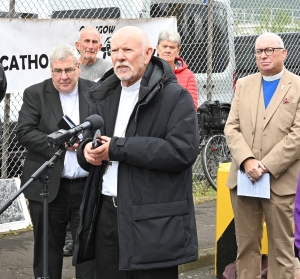It was both inspiring and painful to find myself alongside John Harvey at the recent Christian Peace Vigil at Faslane Naval Base.
The event, organised by Justice and Peace Scotland, served as an opportunity to reaffirm our Christian opposition to the existence of weapons of mass destruction on the site of the UK’s nuclear arsenal with prayer, hymn and reflection. Led by faith leaders Archbishop William Nolan, President of Justice and Peace Scotland and Archbishop of Glasgow; Moderator of the General Assembly of the Church of Scotland, Rev Dr Shaw Paterson and Bishop Andrew Swift, Bishop of Brechin Diocese, from the Scottish Episcopal Church.
John has been part of countless such gatherings over the decades. It inspires that the retired Church of Scotland minister and member of the Iona Community has never stopped bearing witness in his repudiation of nuclear weapons. It pains that this has meant John making his way to Faslane regularly since the first such assembly he brought together in 1968 - the year nuclear submarines docked in the Gare Loch, with the warheads for them stored at the nearby naval base in Coulport.
When John does so approaching the anniversary of the US dropping nuclear bombs on the Japanese cities of Hiroshima and Nagasaki, responsible for the deaths of an estimated 246,000 men, women and children - the 2024 vigil held almost 79 years after that unimaginable carnage - Mr Nii is on his mind.
A man who became his friend, Mr Nii was a Hiroshima survivor that John took to his first Faslane protest 56 years ago. “I did so to alert people to the true dangers of nuclear weapons,” he said. Mr Nii stayed with him and during his visit the pair attended a Glasgow Film Theatre screening of The War Game. A BBC 1965 docu-drama depicting a nuclear war and its aftermath, it caused such uproar within the Corporation and the government over being “too horrifying” that it was not screened on television until the mid-1980s. Mr Nii’s take was different, though. “When we left the cinema, I asked him what he thought of it and he said ‘very bad, very bad’”, John recalled. “I asked him why and he said: ‘it showed too many survivors’”.
Current nuclear weapons are understood to be 30 times more deadly than those dropped on Hiroshima and Nagasaki. It defies any belief in humanity to imagine there could be circumstances whereby any of the nine nuclear powers would consider justifications for their use, and the mass destruction of life and the environment that would ensue.
 In a powerful address at the recent gathering, Archbishop Nolan lamented that such arsenals - and bases such as Faslane and Coulport - were being expanded, and called for governments to focus instead on re-establishing their commitment to the Treaty on the Non-Proliferation of Nuclear Weapons by preventing the spread of nuclear weapons technology and pursuing serious efforts towards disarmament. He demanded a recognition that these weapons, which many countries seek to ban via the UN, serve as no deterrent but rather perpetuate escalation. That those in power could see through the bogus perception of these weapons as a “comfort blanket” - even as moral arguments, and financial arguments, the UK’s renewal of its stock costing £300 billion, do not appear to be cutting through.
In a powerful address at the recent gathering, Archbishop Nolan lamented that such arsenals - and bases such as Faslane and Coulport - were being expanded, and called for governments to focus instead on re-establishing their commitment to the Treaty on the Non-Proliferation of Nuclear Weapons by preventing the spread of nuclear weapons technology and pursuing serious efforts towards disarmament. He demanded a recognition that these weapons, which many countries seek to ban via the UN, serve as no deterrent but rather perpetuate escalation. That those in power could see through the bogus perception of these weapons as a “comfort blanket” - even as moral arguments, and financial arguments, the UK’s renewal of its stock costing £300 billion, do not appear to be cutting through.
As people of faith, the Archbishop reminded us that we too have a special facet in our armoury. “All we can do is pray that our governments and politicians will see that these weapons serve no purpose at all; they don’t make our world more secure but less secure and waste precious human resources,” he said. “Pray the politicians who make the decisions will have a change of heart and cast away their comfort blanket and rid the world of these weapons of mass destruction.”
The Moderator implored that “our present is shaped by the past, our future is shaped by the present”. “Whenever we see images of the attacks on Hiroshima and Nagasaki, whenever we see the devastation to human life, to animal and plant life, we are reminded of the need to care for God’s creation and work for peace,” he said.
Bishop Swift called on peacemakers to be “the prophetic voice” that cries out “not in our name” over the moral offence that is the existence and propagation of nuclear weapons. In a time when those in the global south go hungry and even those in our own country cannot afford to eat and heat their homes.
A thoughtful liturgy crafted by Fr David Stewart of the Jesuits and Rev Sheena Orr of the Church of Scotland, conveyed such messages to those present. A near 50-strong group that covered various religious faiths and none, and comprised all age groups, from teenagers to septuagenarians. With a closing prayer encapsulating the desire of all in attendance.:
Lead me from death to life, from falsehood to truth,
Lead me from despair to hope, from fear to trust,
Lead me from hate to love, from war to peace.